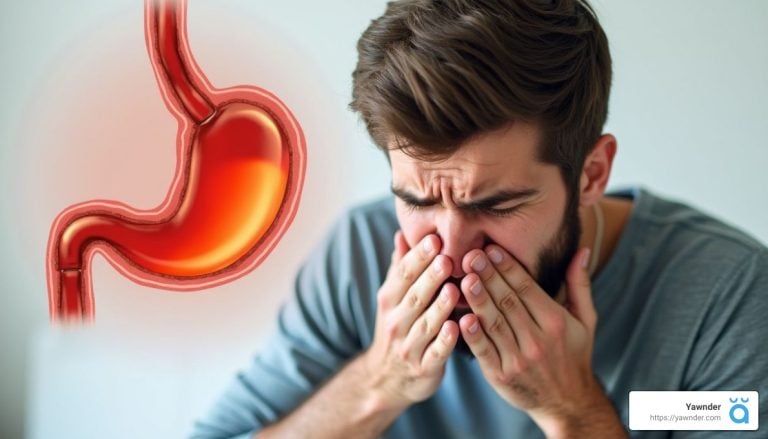A Comprehensive Guide to Understanding Acid Reflux and Burping Symptoms
Is Burping a Sign of Acid Reflux?
Yes, burping can often indicate acid reflux, particularly when it occurs alongside other discomforting symptoms like heartburn and regurgitation. Understanding how digestion and the symptoms of gastroesophageal reflux disease (GERD) interconnect can be vital for managing your health and improving your overall well-being.
Acid reflux, also known as GERD, is a prevalent condition affecting over 60 million Americans monthly. This occurs when stomach acid backs up into the esophagus, leading to symptoms such as heartburn, regurgitation, and yes, excessive burping. If you’re experiencing these symptoms, it’s essential to pay attention, as they could signal that it’s time to seek medical advice.
What is Acid Reflux and How Does it Happen?
Acid reflux happens when stomach acid flows back into the esophagus—the tube connecting your throat to your stomach. This reflux can cause a range of uncomfortable symptoms due to irritation of the esophageal lining. The key culprit in reflux is the lower esophageal sphincter (LES), a muscular valve designed to keep stomach contents contained. When the LES fails to close properly, acid can escape into the esophagus, leading to the classic signs of acid reflux.
Common Symptoms of Acid Reflux
Identifying the symptoms of acid reflux can be the first step toward effective management. Here are the most common signs:
1. Heartburn: A burning sensation that travels from your stomach up to your chest and throat.
2. Regurgitation: This feels like the acid backing up into your throat or mouth, often leaving a sour or bitter taste.
3. Burping: Excessive burping frequently accompanies heartburn. If this is a regular occurrence, it may be time to evaluate whether it’s linked to your acid reflux.
The Link Between Acid Reflux and Burping
When stomach acid moves into your esophagus, it can trigger the swallowing reflex, leading you to inadvertently swallow more air, resulting in increased burping. It’s particularly common in those also experiencing heartburn or regurgitation.
Types of Burping
Understanding the different types of burping can help you identify what you may be experiencing:
– Gastric Belching: This normal burping occurs when swallowed air is released from the stomach.
– Supragastric Belching: This involves air being sucked into the esophagus and then expelled. It can sometimes be a result of a behavioral condition.
Why Does Acid Reflux Exacerbate Burping?
Several factors contribute to increased burping when you have acid reflux:
– Increased Swallowing: Acid reflux can lead to frequent swallowing, increasing air intake and resulting in more burping.
– Abdominal Pressure: Increased pressure on the abdomen—whether through obesity, pregnancy, or tight clothing—can force acid back into the esophagus, aggravating burping.
– Issues with the Esophageal Sphincter: A weak or relaxed LES allows stomach acid to escape, promoting both reflux and burping.
– Stress and Physical Discomfort: Stress can intensify reflux symptoms, including burping. Physical discomfort may also contribute to swallowing excess air.
Understanding the relationship between acid reflux and burping is key to mitigating their impact on your life.
Managing Acid Reflux and Burping
If you frequently experience burping as a symptom of acid reflux, consider these approaches to manage your condition:
Dietary Adjustments
– Avoid Trigger Foods: Stay away from spicy, fatty, or acidic foods that can worsen symptoms.
– Limit Carbonated Beverages: Drinks like soda and beer can lead to increased gas and burping.
– Eat Smaller Meals: Frequent, smaller meals can help lessen pressure on the LES.
Lifestyle Changes
– Eat Slowly: Taking your time can reduce air swallowing.
– Avoid Talking While Eating: This helps limit swallowed air.
– Sleep with an Elevated Head: Elevating the head of your bed by 6-8 inches helps prevent nighttime reflux.
Medical Interventions
Over-the-counter antacids, H2 blockers, and proton pump inhibitors can offer relief. It’s crucial, however, to consult with a healthcare provider if symptoms persist despite making these changes. Severe symptoms like difficulty swallowing, bloody vomit, or severe abdominal pain warrant immediate medical attention.
When to Seek Medical Help
Frequent burping can indicate a more serious underlying issue, especially if accompanied by alarming symptoms. Early diagnosis can prevent complications related to GERD and significantly improve your quality of life.
Conclusion
Acid reflux and burping are common issues that can disrupt daily life. By understanding their symptoms, causes, and effective management strategies, you can regain control over your health. If you’re experiencing frequent burping alongside other reflux symptoms, don’t hesitate to consult with a healthcare professional for a comprehensive evaluation and tailored treatment plan.
Making informed lifestyle adjustments can significantly improve your condition. Whether through dietary changes, lifestyle tweaks, or seeking medical advice, managing acid reflux and its associated symptoms is achievable. A proactive approach ensures you can lead a more comfortable, fulfilling life.

